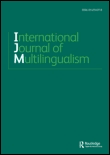
International Journal of Multilingualism
Scope & Guideline
Illuminating the dynamics of language in society.
Introduction
Aims and Scopes
- Multilingual Education:
The journal explores pedagogical strategies, curriculum development, and educational policies that support multilingual learners, emphasizing the importance of inclusive practices in diverse classrooms. - Language Policy and Planning:
Research published in the journal frequently addresses the implications of language policies on multilingual societies, focusing on how these policies shape language use and identity. - Sociolinguistic Perspectives:
The journal examines the sociolinguistic dimensions of multilingualism, including language attitudes, identity construction, and the societal implications of language choices in various contexts. - Translanguaging and Multimodality:
A significant focus is placed on translanguaging practices, which reflect the fluid use of multiple languages in communication, learning, and identity expression across different contexts. - Linguistic Landscapes:
The journal investigates the role of linguistic landscapes in shaping multilingual identities and community engagement, analyzing how public signs and spaces reflect language use and cultural diversity. - Digital Multilingualism:
Research on the impact of digital media and online platforms on language use and multilingual practices is increasingly prominent, highlighting how technology influences language learning and communication.
Trending and Emerging
- Translanguaging Practices:
There is a notable increase in research focused on translanguaging as a pedagogical and communicative practice, emphasizing its role in enhancing language learning and identity expression among multilingual speakers. - Impact of Digital Media:
Emerging studies are exploring how digital platforms facilitate multilingual interactions and learning, highlighting the significance of social media and online communication in shaping contemporary multilingual identities. - Multilingualism in Diverse Contexts:
An increasing number of papers are examining multilingualism in diverse social contexts, such as refugee communities, urban environments, and multicultural education, reflecting the complexities of language use in globalized settings. - Social Justice and Multilingual Education:
Research is increasingly addressing the intersection of multilingualism and social justice, focusing on equitable language practices and policies that support marginalized language communities. - Cognitive Aspects of Multilingualism:
There is a growing interest in understanding the cognitive processes involved in multilingual language acquisition and use, exploring how multilingualism affects cognitive flexibility and language learning strategies.
Declining or Waning
- Heritage Language Preservation:
Although still relevant, the emphasis on heritage language preservation appears to be declining compared to broader themes of multilingual education and policy, as researchers shift towards more dynamic interactions of languages in contemporary settings. - Monolingual Ideologies:
The study of monolingual ideologies is becoming less frequent as the focus shifts towards recognizing and advocating for multilingual practices and identities, moving away from traditional monolingual perspectives. - Static Language Competence Models:
Research that relies on fixed models of language competence is less prevalent, with a growing preference for studies that explore fluid and dynamic language use, reflecting the complexities of multilingual experiences.
Similar Journals
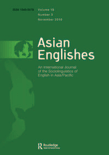
Asian Englishes
Pioneering Research on the Multifaceted Englishes of AsiaAsian Englishes, published by Routledge Journals, Taylor & Francis Ltd, is a leading journal in the field of linguistics and language studies, showcasing diverse English varieties across Asia and their socio-cultural contexts. With an impressive impact factor, it ranks in the Q1 category for both Linguistics and Language disciplines, reflecting its exceptional contribution to the academic community. The journal serves as a vital platform for researchers, professionals, and students who seek to explore the complexities and evolving nature of English usage in Asian settings, providing insightful analyses and fostering scholarly discourse since its inception in 1998. Although not an open-access journal, Asian Englishes is highly regarded in prominent databases such as Scopus, where it ranks in the 90th percentile across multiple categories. The journal's commitment to advancing knowledge in language variation and change remains central to its objectives, making it an essential resource for those dedicated to understanding the dynamics of English in Asian contexts.
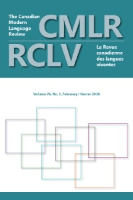
CANADIAN MODERN LANGUAGE REVIEW-REVUE CANADIENNE DES LANGUES VIVANTES
Championing Research that Transforms Language LearningCanadian Modern Language Review - Revue Canadienne des Langues Vivantes is a leading scholarly journal published by University of Toronto Press Inc, focused on the field of linguistics and language education. With its ISBN 0008-4506 and E-ISBN 1710-1131, this journal has established itself as a significant contributor to research in both the education and linguistics categories, currently holding a Q3 classification in Education and a Q2 in Linguistics and Language as of 2023. It boasts an impressive Scopus rank within the top percentiles for both fields, ensuring its validity and relevance among contemporary academic discourse. The journal's emphasis on publishing high-quality research aims to advance understanding and promote effective pedagogical practices, making it an essential resource for researchers, educators, and students passionate about modern languages. The Canadian Modern Language Review has been active from 1996 to 2024, facilitating discussions that bridge linguistic theory and educational practices, although it maintains a subscription-based access approach. Situated in Toronto, Canada, at the Journals Division, 5201 Dufferin St, Downsview, ON M3H 5T8, this journal invites contributions that explore innovative methodologies and critical issues in the field, fostering an environment of academic rigor and collaboration.
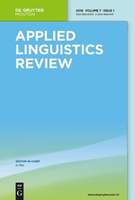
Applied Linguistics Review
Empowering dialogue in applied linguistics.Applied Linguistics Review is a leading academic journal published by WALTER DE GRUYTER GMBH, focusing on the dynamic field of linguistics and language studies. With an impressive Q1 quartile ranking in both Linguistics and Language and Social Sciences, the journal positions itself at the forefront of research, making it a crucial resource for scholars and professionals alike. The journal aims to foster scholarly dialogue by publishing high-quality, peer-reviewed articles that explore theoretical frameworks, empirical studies, and innovative methodologies in applied linguistics. Operating from Poland with an international reach, it is committed to advancing knowledge in areas such as language acquisition, language policy, and multilingualism. Its notable performance can be seen in its Scopus rankings, where it stands at #72 out of 1088 in the Arts and Humanities category and #86 out of 1167 in Social Sciences. The Applied Linguistics Review serves as an invaluable platform for researchers, educators, and students to disseminate and engage with cutting-edge research, thereby enhancing their understanding and application of linguistic principles in diverse contexts.
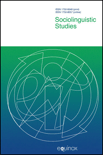
Sociolinguistic Studies
Unraveling the Tapestry of Language and IdentitySociolinguistic Studies, published by EQUINOX PUBLISHING LTD, is a premier academic journal dedicated to advancing the understanding of language in its social context. With an ISSN of 1750-8649 and an E-ISSN of 1750-8657, this journal plays a vital role in the fields of linguistics, sociology, and political science, offering a platform for interdisciplinary research that bridges diverse theoretical frameworks and methodologies. Since its inception in 2008, the journal has remained committed to publishing high-quality research that contributes to the critical engagement with sociolinguistic phenomena globally. With a categorization of Q3 in both Linguistics and Language and Sociology and Political Science as of 2023, and notable Scopus rankings reflecting its intellectual contribution, Sociolinguistic Studies is essential for researchers, professionals, and students aiming to explore the intricate relationships between language, society, and identity. Although open access is not currently available, the journal's scholarly impact continues to grow as it shapes contemporary discussions in sociolinguistics through rigorous peer-reviewed articles.
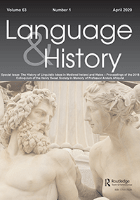
Language & History
Advancing Understanding of Language in Historical ContextsLanguage & History is a distinguished journal published by Routledge Journals, Taylor & Francis Ltd, focusing on the intersection of linguistics and historical context. With an ISSN of 1759-7536 and an E-ISSN of 1759-7544, this journal serves as a vital platform for scholars exploring the dynamic relationship between language evolution and historical narratives. It is recognized for its contributions to the field, holding a Q2 ranking in Linguistics and Language for 2023, reflecting its esteemed position among peer publications. Indexed in Scopus with notable rankings in both Arts and Humanities and Social Sciences, Language & History aims to foster innovative research, shed light on language change, and encourage cross-disciplinary dialogue. The journal operates without open access, providing rigorous peer-reviewed content for researchers, professionals, and students alike, ensuring that cutting-edge studies remain at the forefront of linguistic research. Published biannually, it continues to attract a diverse array of contributions that enrich the understanding of language within historical contexts, making it an essential resource in the academic community.
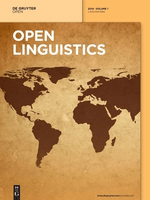
Open Linguistics
Innovating discourse in linguistics for a global audience.Open Linguistics is a premier open access journal dedicated to advancing the field of linguistics, published by DE GRUYTER POLAND SP Z O O. Since its inception in 2014, the journal has consistently provided a platform for innovative research and critical discourse in various subfields of linguistics. With an impressive Q1 ranking in the linguistics category as of 2023, Open Linguistics is recognized for its significant contributions, ranking #223 out of 1088 in Arts and Humanities, as well as achieving a commendable #260 out of 1167 in Social Sciences. The journal's open access policy ensures that research is freely accessible to both scholars and practitioners, fostering a collaborative and inclusive academic community. With a focus on original research, reviews, and theoretical papers, Open Linguistics is positioned as an essential resource for researchers, educators, and students seeking to deepen their understanding of language and its diverse applications in society.

Italiano LinguaDue
Unveiling the Rich Tapestry of Italian Linguistic HeritageItaliano LinguaDue is a leading journal dedicated to the exploration and study of the Italian language and its various facets. Published by Milano University Press, this journal provides an essential platform for academics, linguists, and language enthusiasts interested in the evolving dynamics of Italian linguistics, literature, and cultural studies. Since its transition to Open Access in 2009, it has broadened its reach, allowing researchers globally to share and disseminate their findings without the barriers of subscription fees. Although currently lacking an H-index and specific Scopus rankings, the journal remains committed to advancing scholarly discourse in its field, fostering a collaborative environment for publication among its contributors. By consistently publishing high-quality peer-reviewed articles, Italiano LinguaDue plays a vital role in enriching the academic landscape surrounding the Italian language, making it indispensable for researchers, professionals, and students alike.
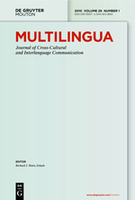
Multilingua-Journal of Cross-Cultural and Interlanguage Communication
Advancing Insights in Cross-Cultural InteractionsMultilingua: Journal of Cross-Cultural and Interlanguage Communication is a premier academic journal published by DE GRUYTER MOUTON, specializing in the dynamic fields of communication and linguistics. Established in 1982, this journal has significantly contributed to the discourse surrounding multilingualism, intercultural interactions, and language acquisition, with a notable reputation backed by an impressive Q1 ranking in both Communication and Linguistics and Language for 2023. Positioned strategically at the heart of Germany, the journal serves as a vital platform for researchers, professionals, and students alike, fostering scholarly exchange and insights into cross-cultural communication practices. With rankings placing it in the top percentiles across key categories in Scopus, including Arts and Humanities and Social Sciences, Multilingua exemplifies the highest standards of academic excellence. Although currently not an Open Access journal, it continues to provide a wealth of knowledge to the global research community.
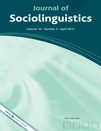
JOURNAL OF SOCIOLINGUISTICS
Fostering Critical Dialogue in Language StudiesThe Journal of Sociolinguistics, published by Wiley in the United Kingdom, is a leading interdisciplinary journal that explores the intricate relationships between language and society. With an impressive impact factor reflecting its Q1 quartile ranking in Histories and Philosophy of Science, Linguistics, Philosophy, and Sociology, this journal is recognized for its scholarly contributions, making it a vital resource for academics and practitioners in these dynamic fields. Covering a wide scope of topics from language variation and change to sociocultural dynamics, the journal has converged from 2004 to 2024, ensuring a comprehensive understanding of contemporary sociolinguistic issues. Although operating under a traditional access model, the Journal of Sociolinguistics remains pivotal for advancing critical dialogue and research for professionals, researchers, and students invested in linguistic and sociological studies.
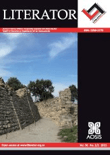
Literator-Journal of Literary Criticism Comparative Linguistics and Literary Studies
Fostering Inclusive Research in Literature and LanguageLiterator - Journal of Literary Criticism, Comparative Linguistics and Literary Studies, published by AOSIS, is a prestigious open-access journal that has been serving the academic community since 1980. With an ISSN of 0258-2279 and an E-ISSN of 2219-8237, this journal provides a vital platform for the dissemination of innovative research in the fields of linguistics and literary studies. The journal proudly maintains an impactful presence within the academia, marked by its 2023 categorization in Q2 for Linguistics and Language and Q1 for Literature and Literary Theory. With impressive Scopus rankings—132nd in Literature and Literary Theory and 448th in Language and Linguistics—it represents the intersection of critical engagement and scholarly inquiry. Literator's commitment to open access fosters inclusivity and broadens the reach of scholarly work, making high-quality research accessible to all. The journal’s scope encompasses critical analyses, comparative studies, and linguistics, inviting contributions that shape and challenge current paradigms. As it converges from 2014 to 2024, Literator continues to illuminate the rich tapestry of literary discourse and linguistic understanding, appealing to researchers, professionals, and students eager to expand their knowledge in these dynamic fields.